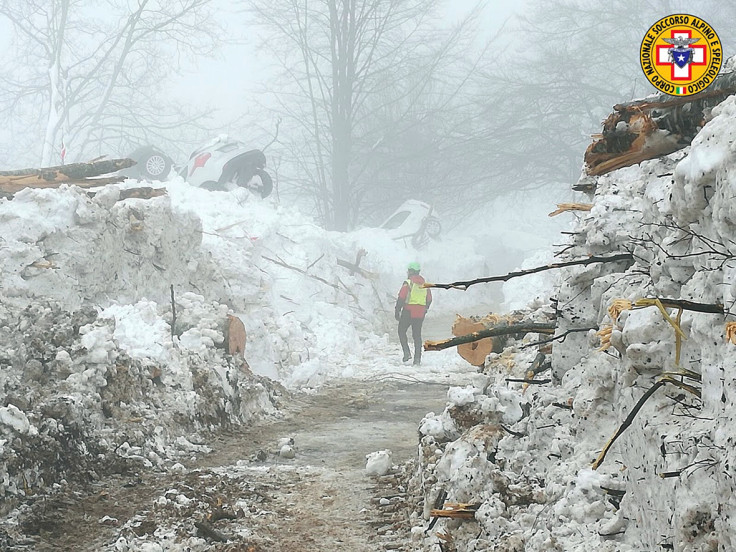No more hope for Hotel Rigopiano avalanche victims as officials count 29 dead and 11 survivors
Two of the children rescued have lost their parents in the tragedy.
Two bodies were extracted from the icy rubble of the Hotel Rigopiano on the evening of 25 January, believed to be the last of the missing victims.
There were 40 people, more than previously reported, in the mountainous resort in the Italian Apennines when an avalanche hit in the evening of 18 January. Two people narrowly escaped death as they were not inside the hotel at the time, and gave the alarm.
A week-long rescue operation was able to save nine people trapped under the snow. For 29 others it was too late. The first six autopsies reveal that some of the victims died crushed by the impact of the avalanche. Others died for a combination of factors, including the avalanche's impact, the lack of oxygen, and the cold.
Among the 11 survivors there is one family and one couple. The others have all lost at least one relative or partner. 6-year-old Edoardo was brought to safety, but his parents Sebastano di Carlo and Nadia Acconciamessa were among the victims. 9-year old Samuel too lost his parents, policemen Domenico di Michelangelo and Marina Serraiocco, despite initial reports claiming they had been rescued.
25-year old survivor Francesca Bronzi was separated from her boyfriend when the avalanche hit. "I did not know what was happening. Something came out of the fireplace. It hit me, it dragged me for metre, I could not move, I had my knees pressed against my chest," she said in an interview to an Italian TV show. She was able to communicate with others who were trapped with her, but did not know what had happened to her boyfriend, who is now counted among the victims.
Giorgia Galassi and Vincenzo Forti were rescued after spending 58 hours under the snow, which they drank to survive. Speaking to the BBC, Galassi described the moment the rescuers first contacted them: "When we heard the rescuer, it was as if an angel was talking to us, as if someone had come to pick us up literally from under the ground. I was born again. It was a miracle."

Questions remain over whether the tragedy could have been avoided. The police is treating the case as manslaughter and is investigating the viability of the emergency plans local government had set up in the area. According to the newspaper Corriere della Sera, the earthquakes that shook the region in the morning of 18 January had prompted fears for an avalanche among the hotel residents, who had reportedly packed and were ready to leave.
They could not, because the snowplough required to free the roads had not yet been dispatched, even if the hotel had contacted the authorities and explained they were isolated and needing help. "The customers are terrified by the earthquake and want to stay outside. We tried our best to calmed them down but, as they are unable to leave due the bad weather conditions, they are willing to spend the night in their cars," the hotel administrator wrote to the authorities a few hours before the avalanche hit.
The investigation will also evaluate whether the hotel should have been built there in the first place. According to geological data, the hotel was built above accumulations of existing debris including those from avalanches, which should have indicated the avalanche risk in the area.
© Copyright IBTimes 2024. All rights reserved.






